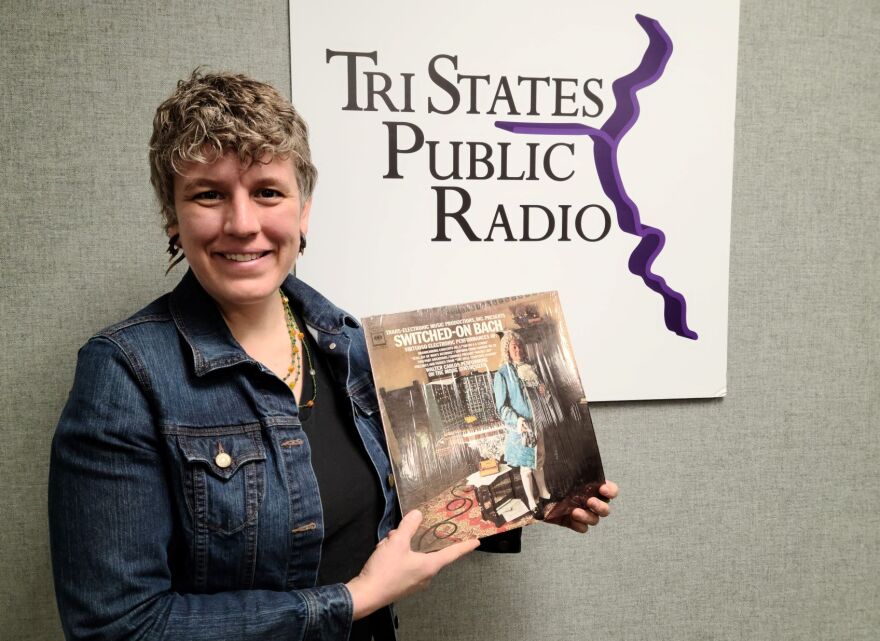Electronically created music is ubiquitous: an ethereal soundtrack, a synthesizer, a DJ.
Have you ever wondered about the beginnings of electronic music? Who are innovators in this sound evolution? And how could someone, like you, start making their own music?
I’m Jade Kastel, the music librarian at Western Illinois University, and today I’ll introduce you to selected creators and innovators in electronic music. After listening to these artists, I hope you are enticed to make your own electronic music. I’ll give recommendations of software and apps that are designed to make creating, recording, and editing music easy and fun.
To start our electronic music excursion, let’s travel back to 1968, when Wendy Carlos released “Switched-On Bach,” a paramount recording on a Moog Synthesizer. This introduction to synthesized sound performs foundational pieces of J.S. Bach’s repertoire played entirely by electronically created sounds.
Perhaps when you think of electronic music, you envision DJs. An international headliner worth checking out is DJ Citizen Jane, who incorporates live singing and strong crowd interactions during performances.
For many, the draw and appeal of electronic music was the freedom to create music separate from the limitations of rehearsal or exclusions in the music scene. Musician, writer, facilitator, producer, and curator AGF aka poemproducer, shares that electronic music provided opportunities to create one's own beats and music, which a composer can then perform solo, or choose to use in collaboration.
If documentaries are your thing, the film “Sisters with Transistors” “...maps a new history of electronic music through the visionary women whose radical experimentations with machines redefined the boundaries of music.”
Want to discover more innovators? female:pressure is an international network of female, transgender, and nonbinary artists in electronic music and digital arts.
female:pressure is searchable by location, profession, style, or name, documenting the talents of composers, DJs, visual artists, cultural workers, and researchers.
This network was created in 1998 by Electric Indigo and addresses a narrative that there are so few women, transgender, or nonbinary people active in the electronic music scene. With a database of over 286 pages of artists, female:pressure illuminates that gender disparity is not about a number, it's about how and if people are recognized.
Curious about getting started in electronic music? Here’s some recommendations of products we use here at the WIU music library that have entry level accessibility in terms of skill and price point.
For a library of beats, bass lines, melodic riffs, and accompaniment tracks, GarageBand is an Apple product, used on devices like an iPhone, iPad, or MacBook. GarageBand, and products like it, bring immediacy to creation. Users can select from a collection of sound loops for a beat or a melody and drag that loop into their composition.
Now let’s say you want to create a mixtape for an ice-skating routine or splice tracks together for a drag performance. The free music recording software Audacity is ideal for these applications. I recently used Audacity to trim and amplify a recording I captured of a barred owl’s call here in Macomb.
Now, I hear you. A barred owl isn’t exactly electronic music, but Audacity and GarageBand allow users to combine live recordings and electronically created sounds, expanding a composer’s palette of possibilities.
If you’re a composer arranger who wants to notate their music onto a staff for others to perform, MuseScore is a free program to notate and listen back to your composition. MuseScore can be set up with a midi keyboard to allow for faster input of notes and chords.
I imagine one outcome of this radio segment will be a heightening of your music scrutiny.
When you listen to music later today on Tri States Public Radio, I’m guessing you’ll be acutely attentive, taking note of a podcast theme song, tuning in to the intentionality of the composer, or noticing music backgrounds behind the news.
Wendy Carlos, DJ Citizen Jane, AGF, female:pressure, and “Sisters with Transistors” are just a sampling of artists and groups who inspire and intrigue me.
And who knows. Maybe the next time I turn on the radio, the music I’ll be pondering might be yours.
Documentary: Sisters with Transistors
Jade Kastel (she/her) is the music librarian and an assistant professor at Western Illinois University.
The opinions expressed are not necessarily those of the university or Tri States Public Radio.
Diverse viewpoints are welcomed and encouraged.


